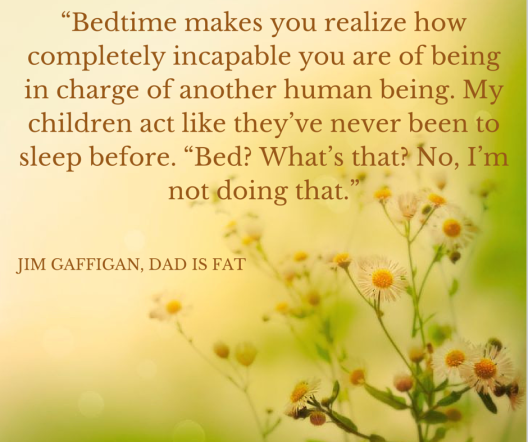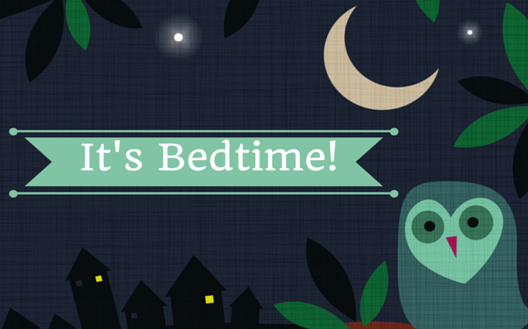I tend to emphasize night sleep because it’s easier to sort things out at night (stop laughing, I’m totally serious). When everybody is sleeping better at night, improving naps is far more likely. And your efforts to improve your child’s night sleep is entirely dependent upon one thing. Bedtime. What happens at bedtime, when bedtime occurs, and how you approach bedtime will determine how well your child sleeps (and thus how you sleep) at night.
Bedtime is the linchpin of the entire night. Much of what happens during the 11-12 hours that makes up your child’s night is determined by bedtime. You can’t make a course correction at 3:00 AM, you committed yourself back at bedtime.
Imagine bedtime is like a path in a dense, bramble filled woods. You hear the howling of wolves behind you, there is no way to go but forward. Then you come upon a fork in the path: which way to go? You choose one way and hike on for a while and then decide, “Ugh, this path is the worst, it’s muddy and smells like possum pee. I should have taken the other path!” But it’s too late and you have no options but to trudge on.
This is bedtime, except generally wolf-free.
Everything starts with bedtime. If you conquer the how, when, and what of bedtime, you are officially a night sleep ninja master (and you get a sassy belt which is remarkably on-trend for this season).

Bedtime: How?
Bedtime begins with a lovely routine that is a set of relaxing activities that are enjoyed by all parties involved. Bath, massage, songs, books, prayers, hugs, kisses, feeding, and cuddles are all popular activities. Ideally your routine is:
- Something that you can commit to doing on a consistent basis – every single night
- Takes approximately 20-30 minutes
- Has decreasing levels of light and activity
- Moves progressively towards the bedroom with the last few steps occurring in the bedroom
If you’re working to gently nightwean your child, then you want to remove all bottles, nursing, and pacifier use from your bedtime routine. So your last bottle/nursing session should be the first step in your 20-30 minute bedtime routine, ensuring there is a solid gap between that feeding and your baby falling to sleep.
Bedtime: When?
Figuring out the right time to put your child to bed can be a bit of a tricky wicket. If I had to put a stake in the ground, it would be 7:30 PM. Most kids between 3 months and age 10 should be going to bed around 7:30.
Ideally your bedtime is early. Early is not always easier for you however. Older siblings (who often have soccer practice, music recitals, etc.) can muck up your good intentions to be home on time. Most parents work which can make evenings feel like a mad dash to pick up baby, shovel some mashed peas into them, and get them washed up for bed. I fully understand why logistically an early bedtime is challenging or undesirable for most parents.
Why is Early Better?
Most Kids Wake Up Early
We have an innate circadian rhythm and when we’re young, that rhythm sets us up to start the day early. If your child is going to start the day at 6:30 AM regardless of when they go to bed, a late bedtime just decreases the overall amount of sleep they’re getting. This pattern of “early rising” continues until they’re teens (anytime after 10-12 years) when their circadian rhythm shifts later and they have a hard time falling asleep before 10:00 PM – 11:00 PM. This isn’t just because they’re teenagers and would rather stay up texting their friends (although screen time doesn’t help), it’s a biological shift. At that point they’ll need to sleep later in the morning, something made almost entirely impossible due to early school start times.
This is why most American teenagers are chronically sleep deprived and are routinely falling asleep in school. It’s also why the AAP issued a public statement about the need to push school start times later. It’s probably hard to get riled up about this when you’re parenting a baby or toddler, but tah-rust me, when that baby is 14 years old and they’re sleeping through calculus, you might feel differently about it.
Babies Can’t Stay Awake That Long
Generally a “too late bedtime” comes part and parcel with an “awake too long.” Often the last nap ends around 3:00 PM, so if bedtime is late you end up with a loooong stretch of time awake. Being awake too long results in excess cortisol production (cortisol is a stress hormone and also a stimulant). Cortisol can make it hard to fall asleep and stay asleep. So your child may struggle to fall asleep at bedtime. Or they may fall asleep without issue but wake up later in the night, unable to easily fall back to sleep. In either case, a “awake too long” issue is no party and, like hungry tigers or my husband before coffee, something best avoided.
At the same time a bedtime that is too early can result in frustrating bedtime battles and a whole host of other sleep struggles.
Confused yet? Hopefully this will help.
How Long Should Your Child be Awake Before Bedtime?
At every age, the stretch of time between the last nap and bedtime should be the longest period of wakefulness during the day. Also the length of this time is almost always longer than the average time between naps during the rest of the day. While some babies fall outside the norm (there are definitely babies who need to go to bed by 6:30 PM or even 6:00 PM) these numbers hold true for the vast majority.
| Age | Time Awake Before Bedtime | Average Bedtime |
| 0-3 Months | 1-2 Hours | Variable – Late 8:00 PM – 11:00 PM |
| 3-6 Months | 2-3 Hours | Shifting Earlier – More Consistent – 7:00 PM – 9:00 PM |
| 6-9 Months | 3+ Hours | Locked In – 7:00 PM – 8:00 PM |
| 9-12 Months | 4_ Hours | 7:00 PM – 8:00 PM |
| 1+ Years | 4-6+ Hours | 7:00 PM – 8:00 PM |
Also please note that when I say “bedtime” what I really mean is “the time at which your child falls asleep.” It’s great to have a delightfully elaborate bedtime routine involving yoga, lavender oil, and interpretative dance so that the whole thing takes a full hour, as long as you’ve allocated enough time for family drum circle. But bed time is the time at which your child falls asleep.
You know you’ve found the right bedtime when your child falls asleep relatively easily at that time. If your child is consistently awake and restlessly farting about in their bed for 30 minutes every night, bedtime might be too early. If you need to bounce your newborn on the yoga ball for a solid hour ever night, you have my sympathies. And also, you also are starting too early. On the other hand if your child is awake far longer than the span suggested in this table and is either a fussy mess in the evening, starts the day unreasonably early, or is waking up (and staying awake) in the middle of the night, you may have a bedtime that is too late.
Lock It Down
Somewhere between 2-3 months your baby should settle in to a consistent and early-ish bedtime. When that happens you want to lock it down so that bedtime happens:
- At the same time
- Every day
- Without fail
- For years to come
Sometimes this is a hassle. Sometimes this requires waking your child up from a long or late-afternoon nap so that napping doesn’t interfere with their ability to fall asleep at their regular bedtime. This often means missing out on fun evening activities because you have to be home early to start your bedtime routine. On the upside, you will never again have to wait for a table at a restaurant because there is almost always room when you show up at 5:00 PM.
Bedtime: What?
What happens as your child falls asleep establishes the basis for how well (or not) your child will sleep at night. If your 6+ month old child needs your help to fall asleep at bedtime, they’ll need your help to go back to sleep during the night. Maybe only 1-2 times. Or maybe 6. But ultimately if your child is sleeping poorly at night, the first step towards making things better is to change what happens at bedtime.
People often try to cheat the system by skipping this crucial step, only to find that their child gets very angry with them during the night, for example when they try to shorten the duration or number of night feeding sessions. Sometimes this can be interpreted as, “Well I guess they’re legit hungry so maybe they’re just not ready.” But it’s not about hunger. If your child falls asleep eating at bedtime or near bedtime, they’ll expect to fall asleep eating during the night. When you try to shorten the feeding and they’re not yet asleep they’ll yell at you, “Woman, do you not see that I’m still awake? Get back in here!”
The same pattern holds for rocking to sleep, cuddling to sleep, etc.

Teaching your child to fall asleep at bedtime is hard, and for many people, so scary they choose to avoid it and nursing, rocking, and cuddling their child to sleep. Which is totally fine, but if your goal is to reduce the number of night wakings or night feedings, you need to put on your fearless hat and change what happens at bedtime.

Nobody does fearless hat better than Raylan Givens. Except for maybe the Dowager Countess.
When you’re ready for solid sleep at night, consider the how, when, and what of bedtime. When you’ve mastered these three crucial elements, you’re well on your way sleeping through the night. Bedtime is the foundation for the rest of the night.
If you’re struggling with the when or what of bedtime, get the Precious Little Sleep Book to create a plan to help your child (and you!) sleep better!

